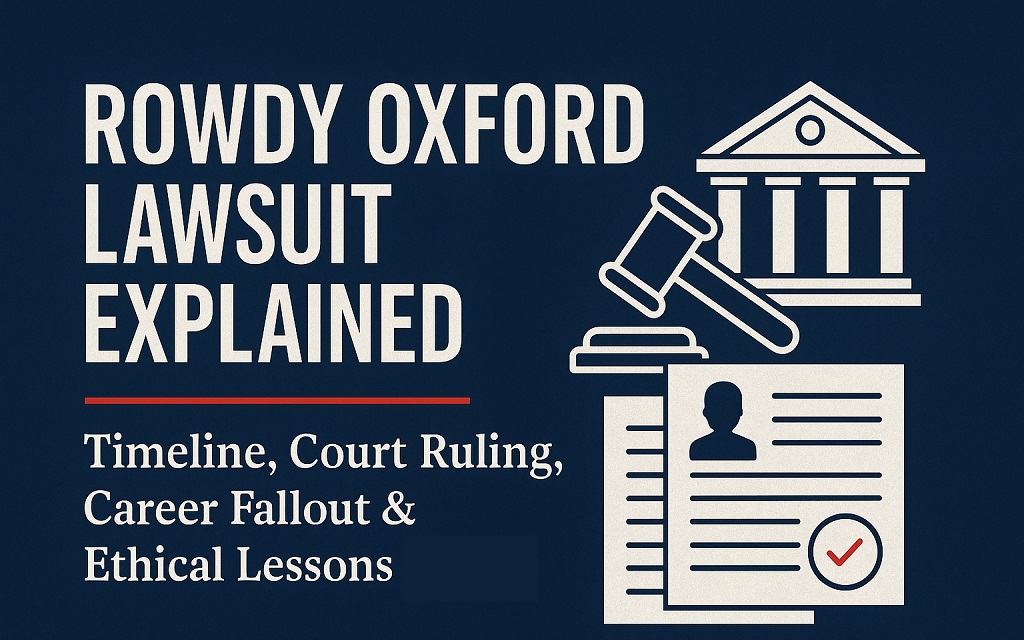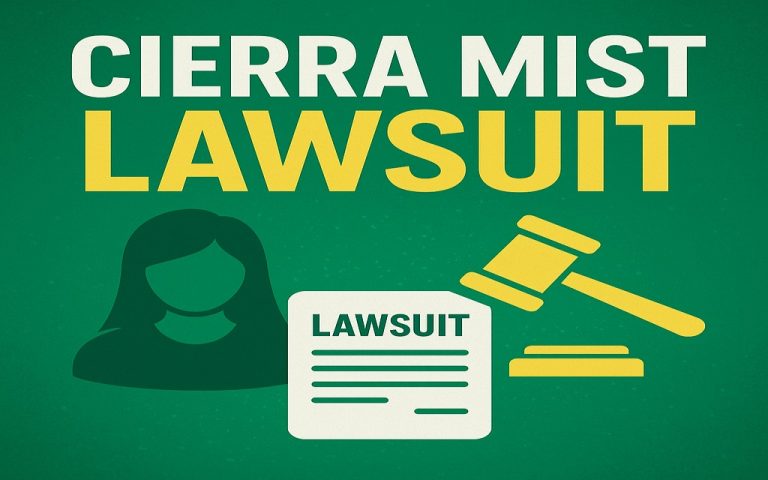What happened between Rowdy Oxford and Integris Composites? The defense sector was rocked by the high-stakes Rowdy Oxford lawsuit in 2024, which raised essential issues regarding company loyalty, CEO ethics, and data security. However, from the court order and legal struggle to the career consequences and industry-wide lessons that every defence contractor should be aware of, we dissect the entire tale in this article.
Table of Contents
Who Is Rowdy Oxford?
Rowdy Lane Oxford is a seasoned executive in the U.S. defense and security industry. Following a distinguished career in the Marine Corps and U.S. Army Reserve, Oxford went on to assume senior positions in corporations. However, his most notable role was as Vice President of Business Development at Integris Composites USA, Inc., a principal defense contractor specializing in ballistic technology and armor systems.
Strategic sales, government contracts, and a wide-ranging network within the military procurement industry formed the foundation of his reputation in the defense industry.
What Triggered the Rowdy Oxford Lawsuit?
In late 2024, Integris Composites discovered potential misconduct involving Oxford shortly after he departed from the company. Oxford’s decision to join Hesco Armour, a direct rival, raised questions immediately about the unapproved transfer of private and proprietary data.
A formal complaint was brought in the U.S. District Court for the Western District of North Carolina as a result of these worries, alleging Oxford of:
- Breach of contract
- Trade secret theft
- Breach of non-disclosure agreements (NDAs) and secrecy
Due to the sensitive nature of the material involved, the legal matter immediately garnered attention from the defense contractor and legal communities.
Key Legal Allegations Against Oxford
The lawsuit, led by Integris Composites, focused on the following core allegations:
1. The unauthorised use of trade secrets
Oxford was charged with stealing private documents from Integris’ servers, including government contract information, pricing plans, and product designs, before he quit.
2. Fiduciary Duty Violation
Oxford had a contractual duty as a VP to maintain loyalty and safeguard confidential corporate data. According to the lawsuit, this obligation was broken.
3. Unfair Competition
Joining a direct competitor and allegedly using prior employer data gave Hesco Armor an unfair business advantage.
4. Violation of the Defend Trade Secrets Act (DTSA)
This federal statute protects companies from the theft of proprietary information. The lawsuit claims Oxford’s actions fall under this statute.
Must Read: Innovasis Lawsuit: Intellectual Property Theft and Contract Breach Claims
Timeline of Events: From Employment to Court Order
Here’s a clear timeline of how the legal drama unfolded:
| Date | Event |
|---|---|
| Mid‑2023 | Oxford serves as VP at Integris Composites |
| October 2024 | Oxford departs and joins Hesco Armor |
| November 2024 | Integris’ internal audit flags data irregularities |
| December 2024 | Federal lawsuit filed against Oxford |
| January 12, 2025 | U.S. District Court issues a Consent Final Order |
The Court’s Consent Order Explained
Judge Max Cogburn of the Western District of North Carolina signed a Consent Final Order on January 12, 2025.
This court-approved agreement included the following restrictions:
- Oxford must destroy or return all proprietary data from Integris.
- No further employment with Hesco Armor or any direct competitor for a specified period.
- Prohibition of seeking government contracts, Integris clients, or vendors.
- IP rights and confidentiality commitments are acknowledged.
Although Oxford did not admit to guilt, his acceptance of the order implies legal weight and consequences.
Oxford’s Background in Defense and Military
Rowdy Oxford’s military record is impressive. He had a variety of operational positions in the U.S. Army Reserve and was a Marine Scout Sniper. However, he was able to directly understand defense requirements due to this experience, which made him an invaluable asset in the business development of security and armor systems.
He later completed leadership courses and gained recognition as a speaker on veteran employment and defense innovation.
However, the lawsuit is made more problematic by Oxford’s transition from military to business life, as he was viewed not only as a trustworthy patriot but also as a CEO.
Implications for Cybersecurity, Ethics, and the Law
The Rowdy Oxford case raises broader concerns about cybersecurity best practices in high-stakes sectors, staff transitions, and data ethics.
1. Non-Disclosure Agreements Are Not Optional
When executives handle government projects and national defense contracts, NDAs become legal firewalls. Breaching them invites serious consequences under both civil and federal law.
2. Data Forensics & Legal Digital Tracing
Integris reportedly used forensic tools to detect unauthorized downloads and file access. This sets a new bar for internal monitoring practices in defense tech companies.
3. Corporate Espionage in the Defense Sector
This case bears a resemblance to internal espionage, even without state actors being involved. It highlights how corporate knowledge—about supply chains, technology specs, and pricing—can be weaponized.
Lessons for Defense Contractors and Executives
1. Implement Role-Based Data Access
Limit access to sensitive files based on need, not title. Monitor file transfers from all devices, including USB drives and cloud storage.
2. Use Exit Interviews Strategically
Ask pointed questions about digital access, file management, and future employment opportunities. Log everything and lock credentials before the final day.
3. Invest in Digital Rights Management (DRM)
Encrypt sensitive documents and require authentication before access, even for internal users.
4. Educate Executives on Legal Boundaries
Not all executives fully understand how NDAs, IP laws, and DTSA regulations apply post-employment.
What’s Next for Rowdy Oxford?
Following the consent order, Oxford has shifted its focus toward consulting and public speaking. Some reports suggest he may advise on veteran entrepreneurship and leadership ethics.
Oxford seems to be redefining the controversy as a professional learning opportunity, while being temporarily prohibited from the defence contractor industry.
However, it remains to be seen if this change signals the end of his business career or the start of a new one.
FAQs
What is the Rowdy Oxford lawsuit about?
Oxford, a former VP at Integris Composites, was sued for allegedly taking proprietary data to a competitor, Hesco Armor. The case led to a federal consent order.
Did Rowdy Oxford go to jail?
No. The case was resolved through a consent final order, not a criminal conviction. Oxford agreed to restrictions without admitting guilt.
What is a consent final order?
A legal agreement where the defendant complies with court terms—such as data destruction or employment restrictions—without admitting liability.
What does this mean for the defense industry?
The case suggests that national defense companies will be subject to further scrutiny regarding executive compliance and data security.
Conclusion
In short, the Rowdy Oxford lawsuit is a landmark case in defense sector compliance. It combines business competition, ethical issues, and federal legislation into a warning to employers and executives alike.
As companies ramp up digital protections and data governance, the Oxford case is likely to become a legal reference point for future disputes surrounding intellectual property, non-disclosure agreements (NDAs), and employee mobility.
Disclaimer: This article provides a general overview of the Rowdy Oxford Lawsuit, based on publicly available information, and is intended for informational purposes only. It does not constitute legal advice.
Musarat Bano is a content writer for JudicialOcean.com who covers lawsuits, legal news, and general legal topics. Her work focuses on research-based, informational content developed from publicly available sources and is intended to support public awareness. She does not provide legal advice or professional legal services.




